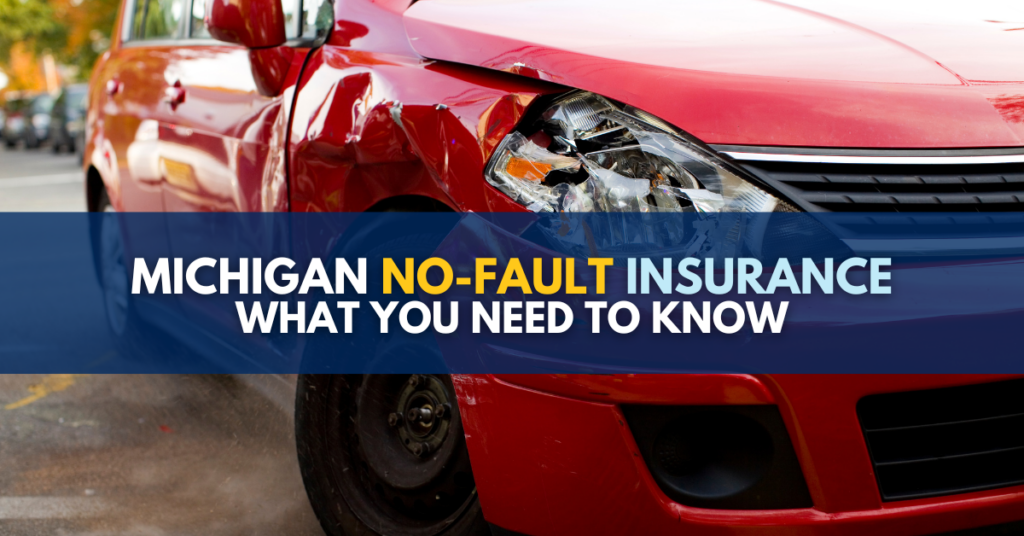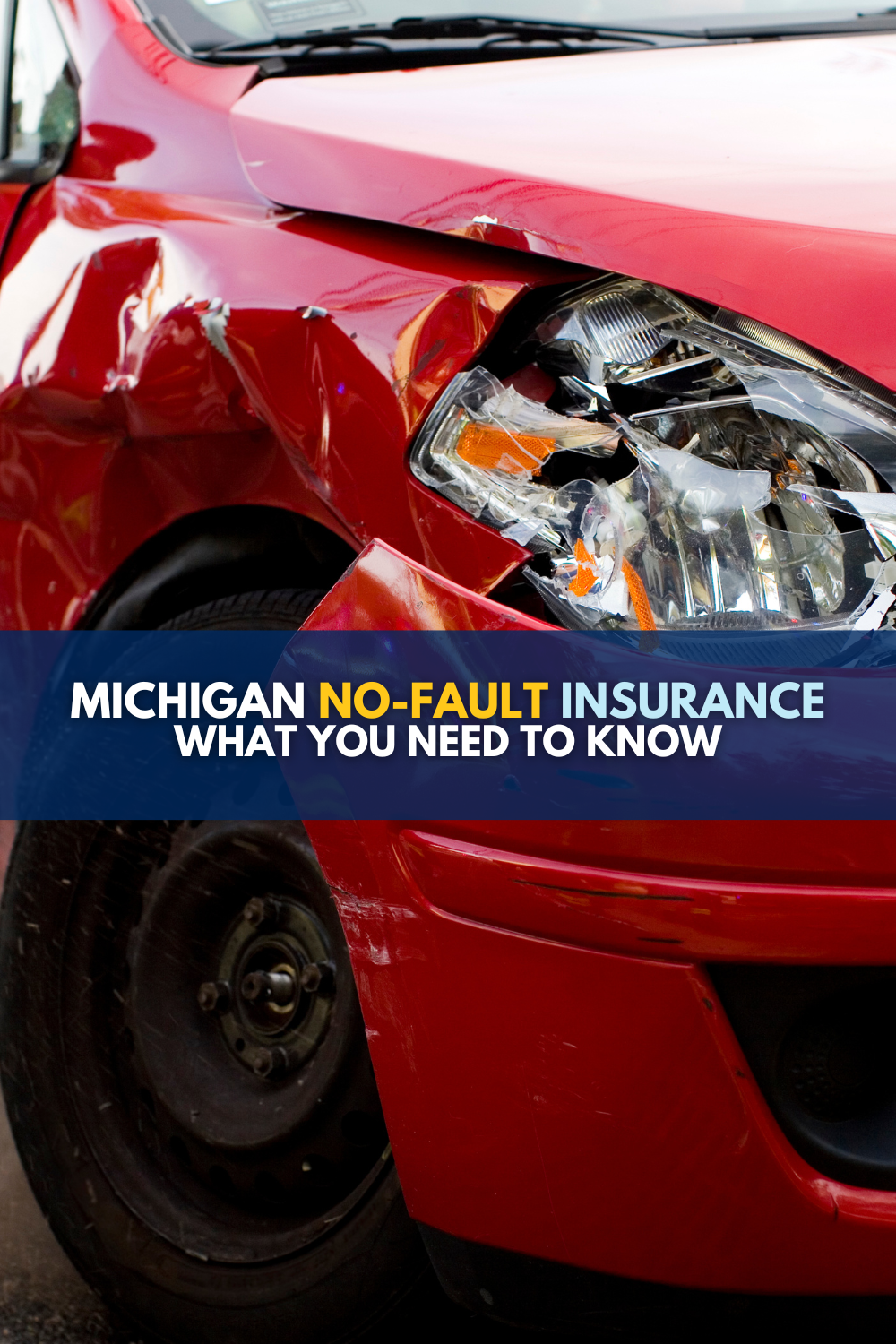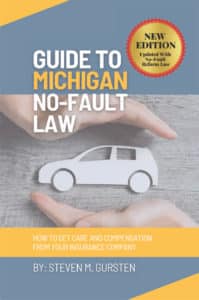Michigan No-Fault Insurance Law Overview: What You Need To Know

The Michigan No-Fault Insurance law was designed to help people like you who have been injured in a car accident.
It is a unique system that ensures that car accident victims get the help they need promptly and without regard to fault.
Specifically, if you are injured in a car accident covered by the Michigan No-Fault insurance law, then you will turn to your own auto insurance company for the benefits you will need to recover and begin rebuilding your life. Importantly, those benefits will pay for your accident-related medical bills and your lost wages if your injuries disable you from returning to work. Getting the help you need does not depend on and require you to sue the driver who caused your accident.
Read on to learn about the protections and benefits you are entitled to under the Michigan No-Fault insurance law.
Is Michigan a No-Fault state for auto accidents?
Michigan is a No-Fault state for auto accidents. Before the Michigan No-Fault insurance law was passed by lawmakers in 1973, Michigan had been a tort liability state. In 2019, the Legislature made historic changes to the auto insurance law that affect every driver, including allowing PIP Choice for the first time ever in Michigan.
To learn more, please check out this video:
What is Michigan No-Fault insurance?
To legally drive in Michigan, state law requires that No-Fault insurance is the mandatory car insurance for anyone who drives regularly in the state. If you are injured in a car accident, your auto insurance company pays for medical bills and lost wages regardless of who was at-fault for causing the car crash
Why does Michigan have No-Fault insurance?
Michigan has No-Fault insurance because the tort liability system that preceded it was hurting car accident victims, not helping them. Seriously injured victims were denied compensation or they were systematically under-compensated. Lengthy delays forced victims to bear devastating financial burdens.
How does No-Fault insurance work in Michigan?
The way Michigan No-Fault insurance works is if you are injured in a car accident, an auto insurance company pays your medical bills and lost wages regardless of whether you were at-fault. Either your own insurer or the legally responsible company will pay once you file an application for benefits.
Recent Michigan No-Fault Insurance Changes
- PIP Choice – For more than 40 years, the Michigan No-Fault insurance law has required drivers to purchase “unlimited” PIP medical benefits which would cover any and all car accident-related medical care and treatment for as much and as long it was “reasonably necessary” for the injured person’s care, recovery or rehabilitation. Under the new law, after July 1, 2020, drivers must select whether they wish to continue with “unlimited” coverage or whether they’d like to cap their coverage at $50,000 (if they are enrolled in Medicaid), $250,000 or $500,000.
- Opt out – For drivers who are on Medicare, they will have the option after July 1, 2020, of opting-out altogether from PIP medical benefits coverage. The intent behind this change is that these drivers would turn to Medicare for medical coverage for injuries suffered in a car accident.
- Attendant care – Under the Michigan No-Fault insurance law after July 1, 2021, auto insurance companies will not be obligated to pay for more than 56 hours per week of in-home, family-provided attendant care.
- Medicare-based fee schedule – Starting July 1, 2021, doctors, hospitals, clinics and other medical providers will have to conform their charges for medical care, treatment and services to the new Medicare-based fee schedule, which will be a percentage of what is payable under Medicare.
- Bodily injury liability coverage – Starting on July 2, 2020, drivers will be required to carry bodily injury liability insurance in the amounts “of not less than $250,000 because of bodily injury to or death of 1 person in any 1 accident” and “of not less than $500,000 because of bodily injury to or death of 2 or more persons in any 1 accident.” Importantly, however, the law also provides that a driver “may choose to purchase lower limits” of $50,000 and $100,000.
- Qualified health coverage – In order for drivers to be able to select certain coverage levels and options that will become available after July 1, 2020, drivers and/or their family members may need to have health insurance coverage that qualifies as “qualified health coverage.”
- Mini tort – The maximum mini tort recovery amount will increase from $1,000 to $3,000 for car accidents after July 1, 2020.
- “Excess” medical expenses – Under the Michigan No-fault insurance law, drivers whose accident-related medical bills exceed the relevant PIP medical benefits coverage level in the auto insurance policy through which they have made their claim, they will be able to sue the at-fault driver in a third-party tort lawsuit for payment of their present and future “excess” medical bills.
- Michigan Catastrophic Claims Association – Under the new PIP medical benefits coverage levels, the Michigan Catastrophic Claims Association (MCCA) will pay for the medical costs of catastrophically injured car accident victims only if “unlimited” was the selected coverage level in the auto insurance policy through which they are claiming coverage. Importantly, however, the MCCA will continue to be liable for catastrophic injury benefits payable under policies issued or renewed before July 2, 2020.
- Michigan Assigned Claims Plan – Any car accident victim who must claim Michigan No-Fault insurance benefits through the Michigan Assigned Claim Plan, which is designed to assign car insurance companies to provide benefits to victims who otherwise has no source of insurance coverage, will be limited to a cap of $250,000 on medical benefits.
To learn more, please check out our video:
More Resources
What happens in a No-Fault accident? – Think of this as a bit of an “intro” course on what car accident victims need to do and think about after they have been injured in a No-Fault accident.
What is PIP Insurance? – For car accident victims, PIP insurance is essential. Under the Michigan No-Fault insurance law it provides the benefits they need to recover from their injuries and rebuild their lives. That’s why PIP stands for “personal injury protection” insurance.
Benefits – Learn about the important PIP benefits you are entitled to from your own auto insurance company after you have been injured in a car accident. Importantly, those benefits include payment of your accident-related medical care and reimbursement of your lost wages if your injuries disable you from returning to work.
Guide to Michigan No-Fault Law – Free Book – Our guide to Michigan’s auto insurance law is a great reference to help car accident victims under their rights and legal protections. Not only is the guide full of valuable information, it is free for you. Order your copy today.
Forms – Under the law, in order to receive the Michigan No-Fault insurance benefits you are entitled to, you will need to file specific forms with your auto insurance company. Here’s where you can find sample forms to use. They include: an application for benefits; attending physician’s report; work disability certificate; wage verification; and attendant care disability certificate and affidavit of services performed.
Accident FAQs – Our experienced car accident lawyers answer the questions that are most frequently asked by people who need help with paying medical bills and getting reimbursed for lost wages after a car accident.
Lawsuits – Hopefully you will never have to file one. But sometimes they are necessary if your auto insurance company is treating you unfairly and refusing to pay the benefits you are entitled to.
Managed Care – Most people are familiar with HMOs and their requirements for preauthorization for services, referrals and seeing in-network doctors. Now, the same type of managed care is available through PIP medical benefits coverage. Here’s what you need to know before you sign up.
Health Insurance – The new law was designed to shift car accident-related medical costs onto drivers’ private health insurance plans. Find out how that might work for you.
Medicaid – Medicaid was intended to be one of the fallbacks for car accident victims who have exhausted their PIP medical benefits coverage under the new law. How is Medicaid intended to work with the new law?
Medicare – The new Michigan No-Fault insurance law allows drivers on Medicare to opt out of PIP medical benefits altogether. Find out how they will work and what Medicare will cover under the new law.
Pain and Suffering – You may be able to sue the at-fault driver who caused your accident and your injuries for pain and suffering compensation and other economic damages. Find out more!
Mini tort and vehicle damage – Wondering how to get your vehicle damage paid for after an auto accident? This section covers the Michigan mini tort, with answers to frequently asked questions, a guide to collecting your mini tort and sample letters to streamline the process.
3 Cases after Michigan Auto Accidents – This diagram provides an at-a-glance view of the three potential cases you have in Michigan if you’ve been injured in an auto accident.
Michigan No-Fault Act and Statutes – Our experienced car accident lawyers explain in everyday language – not legal-speak jargon – what the different aspects of the law mean for people like you who have been injured in a car accident.
Michigan Auto Insurance Reform – Stay up to date with the latest news and information regarding any Michigan No-Fault insurance law reform proposals.
Uninsured Motorist Coverage (UM) – Many Michigan drivers do not have auto insurance. In some cities, like Detroit, 50 percent of drivers are uninsured. Learn how UM can protect you if you’re in a car accident with a driver who has no insurance.
Underinsured Motorist Coverage (UIM) – Many Michigan drivers are “underinsured” or lack adequate insurance coverage to pay for the compensation and/or economic damages they owe after they were at-fault in causing a car accident that injured or killed others. UIM coverage will help protect you if you or a loved one is injured by an “underinsured” driver.
Social Security Disability (SSD) and Your Auto Accident Case – Is your insurance adjuster forcing you to apply for Social Security Disability? Learn how a Social Security Disability claim affects your auto accident lawsuit. We’re taking the guesswork out of the complicated, lengthy SSD process to help you get the best compensation available.
Injured and need a lawyer? Call Michigan Auto Law
If you have been injured in a car accident and you have questions about your legal rights and the benefits you are entitled to under the Michigan No-Fault insurance law, you can call toll free anytime 24/7 at (800) 968-1001 for a free consultation with one of our experienced auto accident attorneys. Contact us here to get help from an experienced attorney or you can use the chat feature on our website.







